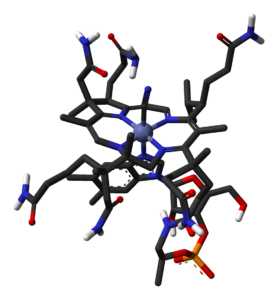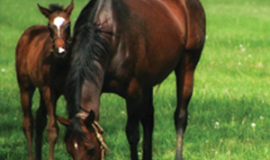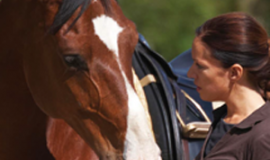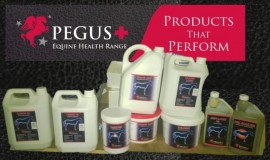Cobalamin (Vitamin B12)
B-vitamins are a group of 8 water soluble vitamins that play important roles in cell metabolism. They cannot be produced by the body itself, but can be produced by bacteria, fungi and plants. In the horse, microorganisms in the gut, mainly the hind gut, are capable of synthesizing B-vitamins. Nutrient requirements have so far only been well established for thiamin (B1) and riboflavin (B2).
Function

Vitamin B12 performs a wide variety of functions in the body. It is a component of several enzyme systems, most of which are concerned with protein synthesis, carbohydrate and lipid metabolism and the synthesis of purine and pyrimidine bases that are crucial parts of DNA and RNA. Purines may also function as neurotransmitters.
Dietary sources
Vitamine B12 encompasses several chemical forms that all have similar vitamin B12 activity. The synthetic form of the vitamin used to supplement feeds or be given to animals is most often cyanocobalamin. The amount of vitamin B12 is low in most grains and also in brewers yeast. However, in most forages it is relatively high compared to the animal’s requirements. Average values for grass hays are about 10 µg per kg dry matter (or 0,01 mg/kg DM). Most of the vitamin B12 in hays originates from bacterial contamination as plants cannot synthesize the vitamin.
Although Vitamin B12 is not synthesized by plants, it is produced by the microbes in the intestines. To synthesize the vitamin, the microbes need cobalt. It is therefore necessary to ensure that the horse receives sufficient cobalt in its ration. The requirement for cobalt is set to 0,05 mg per kg dry matter in the ration for all categories of horses (NRC, 2007)
Compound feeds are often supplemented with 0.10-0.15 mg (100-150 µg) vitamin B12 per kg dry matter. However, not all compound feeds for horses are supplemented with the vitamin.
Requirements
Based on available literature and requirements given for other domestic animals, PC-Horse provides the following guidelines for vitamin B12in horse rations:
For all types of adult horses: 0.0002 mg (0.2 µg) per kg body weight. For young growing horses, the calculation is done according to expected adult body weight.
Deficiency
Vitamin B12 can be stored in the body, mainly in the liver. Deficiency symptoms have not been reported in horses.
Toxicity
As vitamin B12 is a water-soluble vitamin, excess intake will be excreted in the urine and in the bile. Vitamin B12 toxicity in horses has never been reported.
PEGUS PC-Horse
Pegus PC-Horse calculates guidelines for Vitamin B12 requirement individually for each horse. Where values can be obtained, B12 content is included in the feed tables. When composing rations using PC-Horse, you will always be able to control that the intake of vitamin B12 (and cobalt) is at least sufficient to comply with the proposed guidelines. However, as requirements for the vitamin do not exist, you will not be warned of any deficiency or excess.
For more information Contact Pegus Horse Feed
www.pegus.ie info@pegus.ie Free Phone Helpline R.O.I.= 1800-378463 UK = 0800 011 4182
The article is written by Dr. Dag Austbø at the Norwegian University of Life Sciences institution







